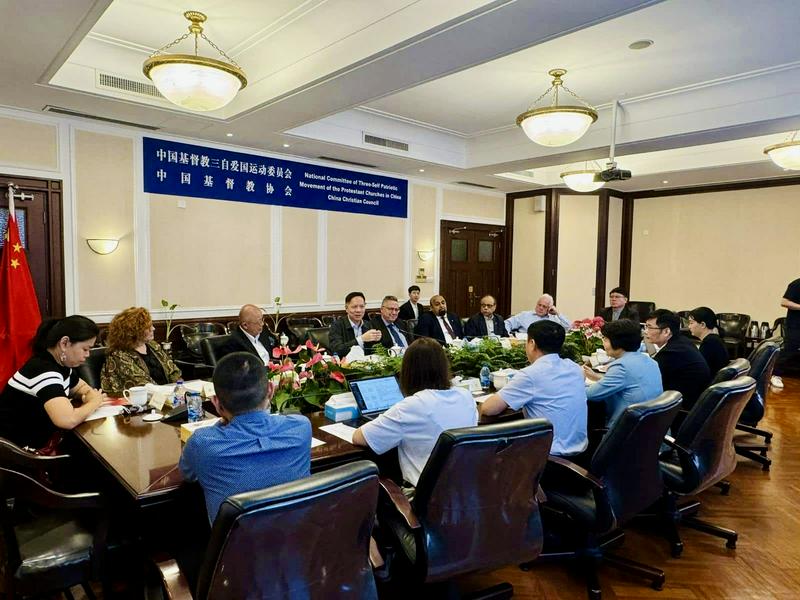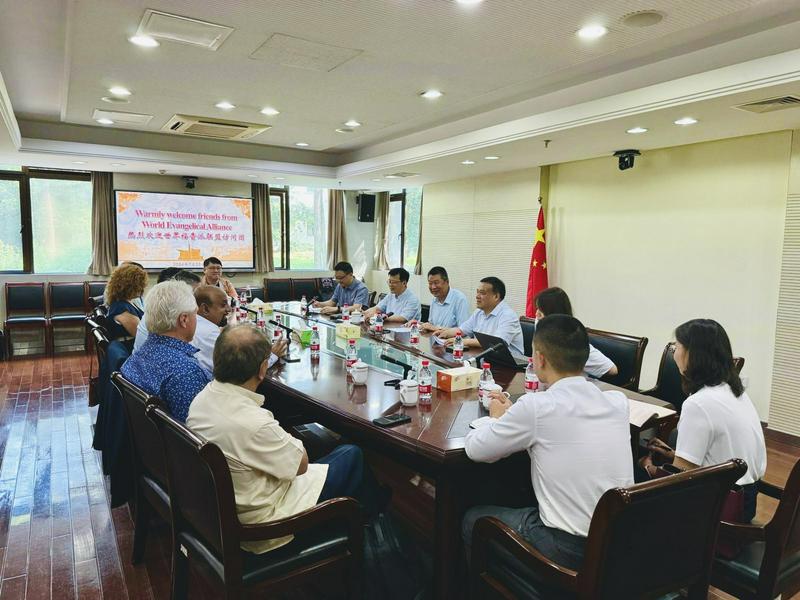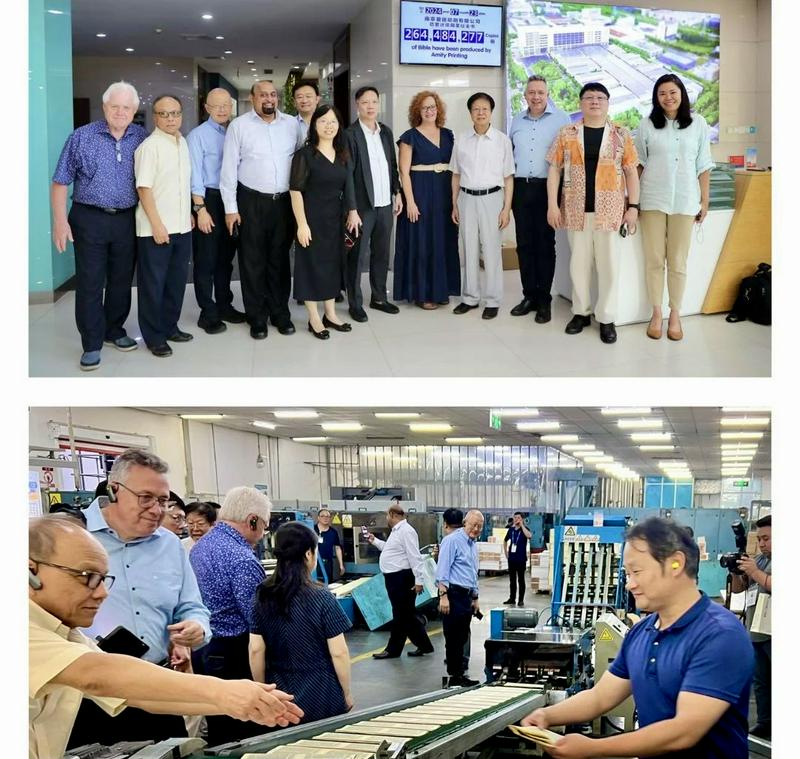Introduction
From 20 July – 24 July 2024, a global delegation from the World Evangelical Alliance (WEA) and the World Chinese Christianity Alliance–our affiliated organization that serves Chinese Christians all over the world visited China to learn about the state of Christianity in China and rekindle ties with with key leaders of the Three-Self Patriotic Movement (TSPM) and the China Christian Council (CCC).
This delegation was organized by Rev. Ezekiel Tan, Special Envoy of WEA to China as well as an International Council (IC) member of the WEA. Rev. Dr. Frank Hinkelmann, Vice Chair of the IC of the WEA led the delegation. Other members of the delegation include Rev. Godfrey Yogarajah, Chair of the Asian Evangelical Alliance and IC of the WEA, Dr. Mario Li Hing, Chair of the African Evangelical Alliance and IC member of the WEA, Connie Duarte, General Secretary of the European Alliance and IC member of the WEA, Dr. Brian Stiller Global Ambassador of the WEA, Rev. Samuel Chiang, Deputy Secretary General of Ministries of the WEA, Dr. Peirong Lin, Deputy Secretary General of Operations of the WEA and finally Rev. Gabriel Teo, World Chinese Christianity Alliance Secretariat. They were accompanied by Ms Jingqin Gu, Interim Director Overseas Relations Department CCC&TSPM. The last time the WEA visited China was in 2017, when then Secretary General, Bishop Efraim Tendero, led a delegation.
The Itinerary
The visit started in Beijing with a worship service at Chongwenmen Church, founded as Asbury Church in 1870. After the service, Rev. Liu Cuimin, president of Beijing CC and senior pastor of the church together with other staff of the office shared about church current activities.
In the afternoon, the delegation met with a delegation of the Beijing Christian Council. Leading the delegation of the Beijing Christian Council were Chairman Rev. Wu Weiqing of Beijing CC & TSPM as well as Rev. Li Hua, vice president and general secretary of the Beijing Christian Council (CC). A key point discussed during this meeting was the Chinanization of Christianity. For them, the goal of the Chinese church is one that is faithful to biblical truth, rooted in Chinese culture and adapted to Chinese society. The use of Sacred Music has been integral in the adaptation to the Chinese society. Rev. Li Hua emphasized that there was no desire to change doctrine, but rather what was hoped for was contextualization that leads to the sustainability and adaptation of the Christian faith in the Chinese context.
On the 22nd July, the WEA delegation visited the National Religious Affairs Administration at their compound, Prince Chun mansion. Director Wu Guosheng reiterated the existing freedom of religion in China with the presence of five major religions: Taoism, Buddhism, Islam, Protestantism, and Catholicism. As a land ruled by law, Chinese citizens have been living in religious harmony and WEA is welcomed to engage within those boundaries for the sake of the Christians in the country.
On the 23rd July, the WEA delegation visited both Nanjing Union Theological Seminary as well as Amity Printing Press and Foundation. Nanjing Union Theological Seminary was formed through the merging of 12 different theological seminaries as China moved towards a post denominational Christian scene. Offering bachelors, masters and doctoral level of education across the whole of China, Nanjing Union Theological Seminary is the premier seminary as it leads in the training of pastors and theological reflection on Chinanization. They provide holistic education to their students, with the inclusion of spiritual formation activities outside academic excellence. In discussing the work of the Holy Spirit in China, the delegation remarked that it was the Holy Spirit that provided them with a sense of unity during the years of persecution. They have felt the spirit at church powerfully as wind, rain and fire in the way church has developed.
Nanjing Amity Printing Company is a joint venture between the Amity Foundation and the United Bible Societies. First focused on printing bibles for China, as of 23 July, they have printed more than 264 million Bibles in 229 different languages. The Amity Foundation seeks to serve society through the promotion of holistic development and public welfare. They have been involved in supporting the revitalization of rural communities in China as well as recent international disaster relief.
On the 24rd July, the WEA delegation visited the national CCC and TSPM headquarters and met with Rev. Dr. Lin Manhong, Vice President and General Secretary of CCC, Rev. Geng Weizhong, Residential Vice President of CCC, and Mr. Gu Mengfei, Secretary General of National TSPM, along with other colleagues. The state of Christianity in China was described and WEA colleagues shared insights from where they are and how the Spirit of God had moved in the regions where they are at.
In discussing the project of Bible translation embarked by TSPM, the Chinese leaders pointed out that the objective of this exercise is to better articulate the meaning of the text in mandarin as originally intended. They have brought together a team of Chinese biblical scholars that are skilled in the ancient languages as well as the Chinese language. By and large, they operate on the principle of keeping status quo as far as possible. Within the Chinese culture, history holds a special place and the Bible as sacred text is treated with reverence. They remarked that the current Bible that they have been using was the Chinese Union version that was updated in 2010. This version retained the primary translation of the version in 1919.
The visit to the national CCC and TSPM headquarters ended with a visit to the newly renovated Holy Trinity Cathedral and the Grace Telling Bookshop.
Collaborating for the sake of the Gospel
One observation made during the several visits was the desire for more resources. it was evident the pressure felt due to the shortage of Christian workers in the churches. As reported, there are approximately 38 million Christians who attend TSPM churches. At present, it has been a challenge to shepherd these Christians well due to the lack of trained Christian workers. WEA shared ideas for further collaboration which was welcome by leaders.
A Global Movement
Throughout the visit, WEA used the Bebbington Quadrilateral, a well know descriptor to describe Evangelicalism. This included Biblicalism, Crucicentricism, Conversionism and Activism. The delegation further emphasized the global nature of Evangelicalism and how different regions have sought to contextualize so as to further indiginze their faith wherever they are. Such an understanding of Evangelicalism resonated with the Chinese leaders WEA met. One emphasized TSPM & CCC desire to be faithful to the Bible and his personal motivation to support believers in expressing their faith in the Chinese Context. Another described their belief in the incarnated God, the historical Jesus who lived, died and was resurrected. There was evidence of the growing and deepening faith Christianity is and the baptisms that they have been witnessing. Church leaders are actively involved in evangelism at their church especially during Christmas. As WEA leaders were leaving the national CCC & TSPM headquarters, Rev Dr. Lin unabashedly refered to the Christians in China as Evangelicals. For her, Chinese Christians share a deep desire to serve the same God and she asked for believers all around the world to embrace them as part of the Evangelical family.
Originally from Webpage 'The WEA'
CCD edited and reprinted with permission














